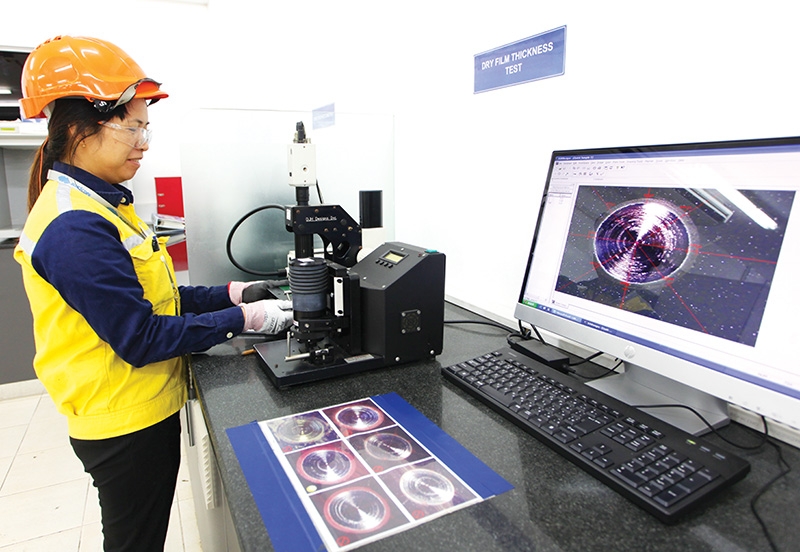Mutual merit in Australian investment
 |
| Dr. Craig Emerson, director of the Australian APEC Study Centre |
Vietnam’s success in containing COVID-19 with minimal economic fallout compared to other nations has improved its already-strong reputation for competent governance. The government has been liberalising Vietnam’s economy for decades and is now reaping the benefits of rapid growth.
Vietnam has stood to gain from the recent US-China trade conflict with many companies relocating at least some of their production facilities there. Vietnam is also rapidly adopting digital technologies to deploy automation, smart manufacturing, and big data analytics. Competent economic management, consistent reforms, swift digital uptake, and effective COVID-19 containment make Vietnam a very attractive destination for trade and investment in 2021 and beyond.
Economically, Vietnam is becoming a manufacturing powerhouse, particularly for electronics and apparel. It is also becoming a focal point for regional value chains with preferential access through free trade agreements (FTAs).
It has taken up trade deal commitments and accepted assistance to develop the institutional and regulatory environment, infrastructure, and facilitation to attract investment. The country is also actively working on non-tariff barriers to trade including intellectual property protection, food safety regulations, restrictions on the internet and digital economy, and other governance issues to accelerate the absorption of investment.
Vietnam needs to be considered in terms of its unique qualities and context. It is following its own development path in a new time, with different conditions, drivers, and realities. Comparisons can be made to Japan with its appreciation of tradition; to Singapore with its open trade policies and architecture; China’s southern Guangdong province in population scale and economic activity; and Indonesia in terms of benefits from a demographic dividend.
Vietnam has a web of FTAs that make it a strategic location for foreign investment as it offers preferential access to several markets. Vietnam continues to attract high levels of such funding from Japan, South Korea, Singapore, China, the United States, and other countries.
Vietnam maintains an ASEAN-first policy but is drawing attention from global investors, particularly due to its economic growth despite COVID-19 and attracted projects from more than 100 countries into its industrial zones during 2020.
 |
| Enterprises from Australia are being encouraged to look into new business prospects in Asia. Photo: Le Tien |
Approaching the market
The drivers of growth in Vietnam create attractive conditions and opportunities for Australian business in the post-pandemic environment. There is scope for manufacturing, agriculture, resources, and services businesses to expand engagement with Vietnam, now and into the medium term. The country’s rapid evolution will continue creating further chances as the economy and consumption mature.
There can be an increase in trade in goods where Australia has proven export capacity and readiness to meet demand in Vietnam. There are also possible increases in the value-added contribution of Australian content in Vietnam’s exports of manufactured products.
In addition, there are prospects to increase services trade in existing and new areas, particularly around education, healthcare, insurance, and environmental services. Both governments have prioritised these sectors under the expanding bilateral economic framework. Investment opportunities exist across the manufacturing, agriculture, services, and resources sectors and there are also those in relation to Vietnam’s digital transformation.
Globally, Vietnam is a major exporter of electronic equipment, apparel, and footwear. In terms of the Vietnam-Australia bilateral relationship, there are prospects for expanding Australian exports of beef, wheat and barley, cotton, horticultural products and processed food. There is also scope to expand exports of services in the education, ICT, mining technology, insurance, and environmental and healthcare sectors.
Australian businesses should also be aware of new prospects emerging in relation to Vietnam’s digital transformation and efforts to modernise economic activity through automation, AI, the Internet of Things, and big data.
Vietnam’s top merchandise imports from Australia are coal, iron ore, cotton, live animals, scrap iron, wheat, aluminium, copper, zinc, fruit, and nuts. The proportion of raw materials in the trade flows has steadily increased this century and now represents around half of all Australian merchandise exports.
Trade opportunities for Australia are supported by policy settings in Vietnam that are generally encouraging of foreign investment to advance the country’s position as a major regional trader. Australia’s exports show that businesses are already participating in value chains to which Vietnam belongs.
When semi-processed metals and fibre are shipped from Australia, it is likely they are being sourced by Vietnamese factories as inputs for final products, many of which are exported again for sale.
Vietnam is a promising market for company investment as a densely populated, developing, and urbanising country which is transitioning to an industrial and market-based economy through trade and investment and making great strides to position itself for Industry 4.0. Australia is currently a relatively small investor, but stock has doubled since 2015 and is growing faster than Australian investment into other ASEAN economies.
Most of Australia’s investment in Vietnam is in manufacturing (47 per cent) with lower levels in hospitality (8 per cent), construction/real estate (7 per cent), agribusiness (6 per cent), and healthcare (6 per cent).
Vietnam has historically had some state-owned enterprises (SOEs) with monopolies in particular sectors, some of which continue to operate. Under the Comprehensive and Progressive Agreement for Trans-Pacific Partnership (CPTPP), Vietnam has committed to providing member countries with a level playing field for their companies competing with SOEs and ensuring any state-designated monopolies do not abuse their market power. Vietnam has also introduced legislation to equitise and divest SOEs and monopolies and ensure that they are offered only limited state preferences.
The CPTPP provides preferential access for Australian businesses to invest in Vietnam. It has the most liberal conditions for any foreign investors in Vietnam and these conditions are also available to other CPTPP members, including two of Vietnam’s largest investors, Japan and Singapore.
Australian movement
Australian businesses are being urged to expand engagement with Asia to capitalise on economic complementarities, diversify supply chains, and benefit from regional growth and integration. As an advanced and globally connected economy in the region, Australia is well placed to benefit from engagement with neighbouring Asian economies to build trade, investment, and innovation networks.
Even before the pandemic, heightened geopolitical tensions in the region driven by a more competitive relationship between the United States and China had highlighted the need for Australia to have a broad and diverse network of trading partners. Many companies in the US and Australia began to adopt a China+1 strategy, with Vietnam emerging as a preferred option.
As the pandemic struck and brought many supply chains to a standstill, first in China and then around the world, businesses and governments soon became painfully aware of their exposure to policy changes overseas. In some cases, this led to calls in Australia to re-shore supply chains, especially for essential medical supplies. More generally, although trade with Vietnam and other economies will not replace trade with China, it may help build resilience.
Australia is generally well-regarded in Vietnam. It is a considered a high-income, advanced economy with much to offer in terms of technology, managerial know-how, and skills. Brand Australia has a strong reputation for being high-quality, safe, and reliable. Exports of goods such as baby products, food, vitamins, and supplements are testament to this reputation.
As the business culture in Vietnam is strongly governed by relationships, Australian businesses should draw on the thriving Australia-Vietnam ecosystem already in place. Onshore and offshore resources are available from national and state governments, industry bodies, academia, students, alumni, diaspora, and locals. The insights and connections of Vietnamese diaspora in Australia, Australian expatriates in Vietnam, and Australian-educated Vietnamese students and graduates will prove invaluable to prospective businesses.
There are a lot of economic complementarities underpinning trade and investment between Australia and Vietnam, as well as traded sectors with the most potential for growth. Besides these, numerous opportunities are arising from the rapid digital transformation of both economies with the adoption of smart manufacturing, digital technologies, and data analytics.
Both governments are equally open about their support for a rules-based security and economic order in Asia, continued trade liberalisation and the centrality of ASEAN in maintaining regional stability.
There has been no better time for Australian businesses to engage in Vietnam. Despite pandemic-related challenges, its economy grew by nearly 3 per cent in 2020 while many of its regional peers, including Australia, fell into recession. Opportunities will continue to unfold for Australian businesses which are willing to engage and adapt to local market conditions, cultural realities, and leverage Australia’s unique assets in the burgeoning eco-system.
What the stars mean:
★ Poor ★ ★ Promising ★★★ Good ★★★★ Very good ★★★★★ Exceptional
Related Contents
Latest News
More News
- Hermes joins Long Thanh cargo terminal development (February 04, 2026 | 15:59)
- SCG enhances production and distribution in Vietnam (February 04, 2026 | 08:00)
- UNIVACCO strengthens Asia expansion with Vietnam facility (February 03, 2026 | 08:00)
- Cai Mep Ha Port project wins approval with $1.95bn investment (February 02, 2026 | 16:17)
- Repositioning Vietnam in Asia’s manufacturing race (February 02, 2026 | 16:00)
- Manufacturing growth remains solid in early 2026 (February 02, 2026 | 15:28)
- Navigating venture capital trends across the continent (February 02, 2026 | 14:00)
- Motivations to achieve high growth (February 02, 2026 | 11:00)
- Capacity and regulations among British areas of expertise in IFCs (February 02, 2026 | 09:09)
- Transition underway in German investment across Vietnam (February 02, 2026 | 08:00)

 Tag:
Tag:




















 Mobile Version
Mobile Version